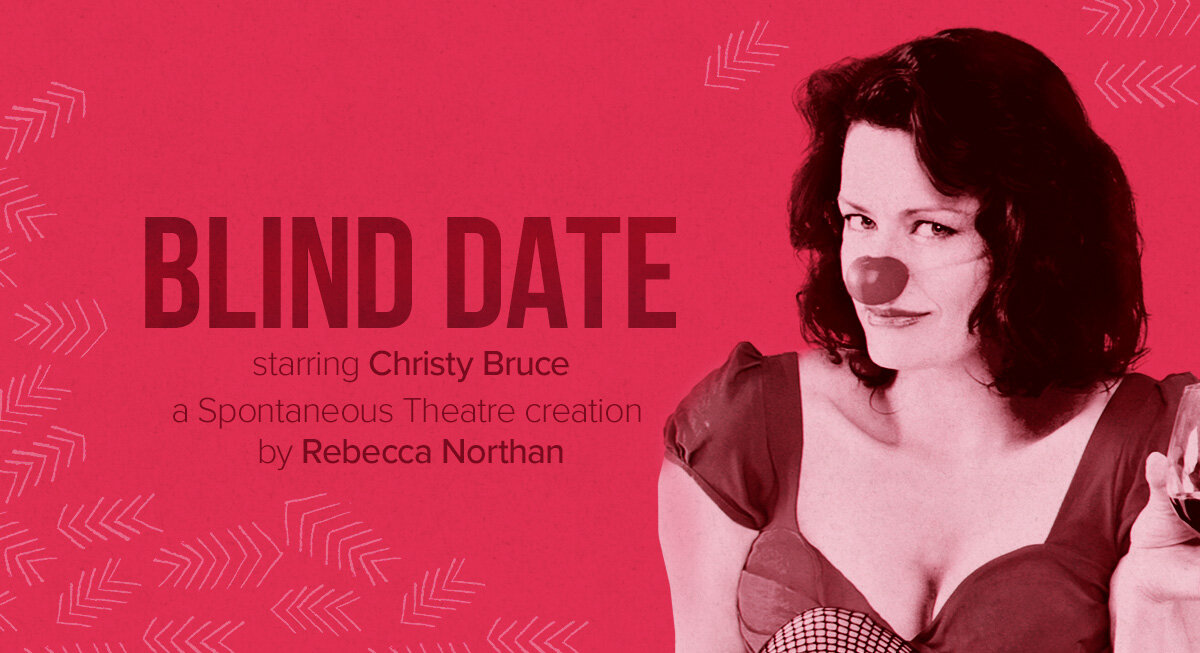Go on a Blind Date with Festival Players

This August, Festival Players is bringing Rebecca Northan’s creation, Blind Date, to Prince Edward County. At the Regent Theatre in Picton, Ontario, audiences can watch Mimi (played by Christy Bruce) go on a blind date, and even have the chance to participate in the date. Blind Date is part improv, part clowning, part miming, and makes for a fun night out for audience members of all kinds.
“Once the show begins, Mimi explains the rules, and gives the participating audience member the opportunity to call “time out” at any point during the show if they are feeling uncomfortable or need a break.”
Although Blind Date may have started out as an experimental theatre piece, by now—700 performances later—it runs like a well-oiled machine. Before the house opens, Mimi mingles amongst the audience in the foyer, letting everyone know that she is looking for a date for the evening. When Bruce is playing Mimi, she is searching for a male audience member to go on a date with; however, this can change depending on the sexual orientation of the actor playing Mimi. Shy audience members are assured that they will not be pulled onstage unless they give their express consent to do so. Once the show begins, Mimi explains the rules, and gives the participating audience member the opportunity to call “time out” at any point during the show if they are feeling uncomfortable or need a break. If the audience member’s partner is in the audience, they are also given one opportunity to call “time out.”
By giving an audience member a leading role in the play, traditional theatrical conventions begin to crumble. Audience members become comfortable with calling out to Mimi and her date throughout, often giving her date advice—for example, in the performance I witnessed, audience members told Mimi’s date to “dance with her” when romantic music began playing. It also pulls in elements of the real world into the show, since it is difficult to forget that the audience member is, in fact, an audience member, who will be going back to their regular “real world” life in 90 minutes. Mimi’s blind date for the night I went to see the show was named Rick, and he had a wife and three children in real life. He was instructed for pretend to be single in the world of the play, which he did a pretty good job of—until Mimi began putting the moves on him, trying to procure a goodnight kiss. As a witness to this, I felt torn between rooting for Mimi and Rick in the world of the play, and rooting for Rick and his real world partner, who was also watching the show.
After seeing Blind Date, I couldn’t help but compare it to a theatrical version of The Bachelor/Bachelorette. Reality dating TV shows are ultra trendy—there’s something so intriguing about watching real people fall in and out of love with each other. Similar to Blind Date, these reality shows are combination of real and scripted, however, they take it one step further by adding real world consequences (for example, emotional attachment, heartbreak, or even marriage). I would be curious to know if any of Mimi’s dates have resulted in romantic feelings in real life.
Plays that pull in real world elements, or theatre of the real, appear to be growing in popularity. Perhaps audiences are becoming less interested in theatre as an escape from reality, but rather, prefer to see reality through the lens of performance. As the lines between what is real and what isn’t blur, we are able to uncover unique truths about humanity. In Blind Date, audiences get to watch Mimi shine a spotlight on what makes her date loveable, and see how the actions of the audience member shapes Mimi’s behaviours, the environment (via improvised lighting and sound cues), and the story itself.
